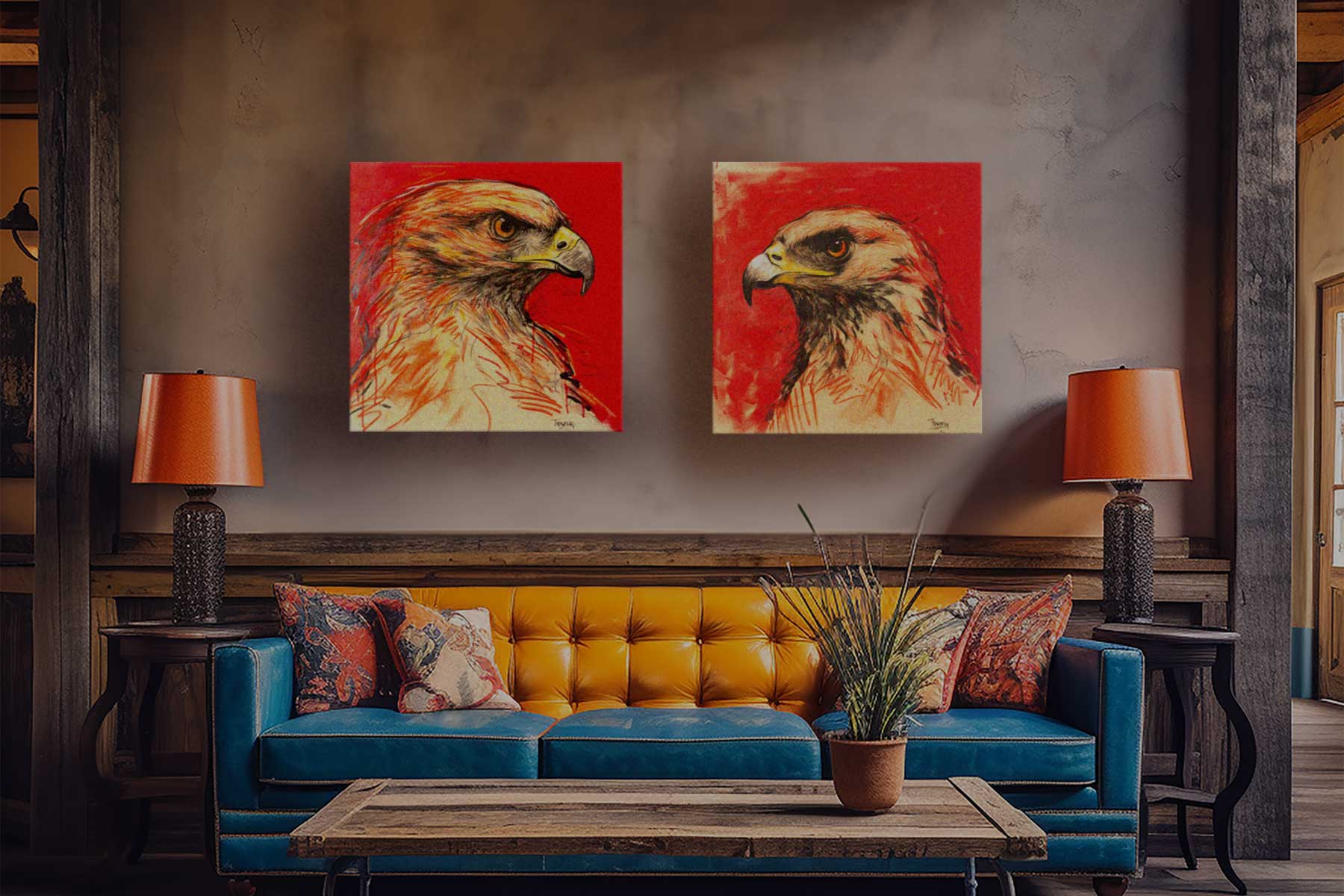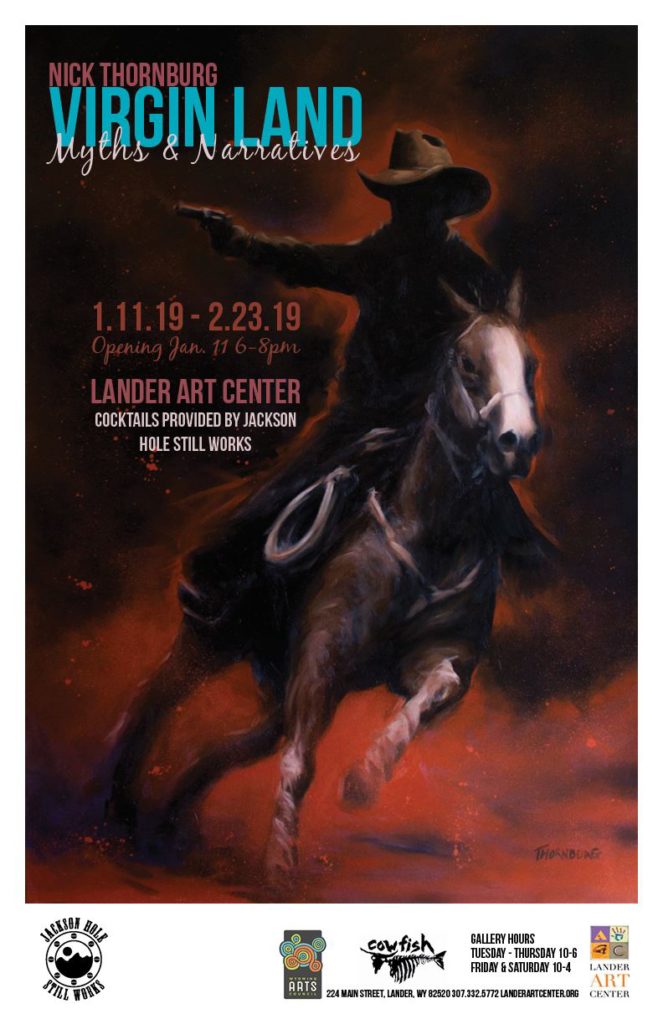Virgin Land: Myths & Narratives is an exploration of the mythological canon of the American West. The title reflects a mindset that helped fuel westward expansion, an image that depicted a vast territory teeming with unclaimed resources ripe for the taking — a veritable Eden-like wilderness ready to be conquered and brought to heel. It was the land itself that provided the genesis for many of the cultural narratives unique to the West, including those about land use, ownership, masculinity, and violence.
The show features four narratives familiar to the western mythos alongside a progression of artistic styles to help illustrate them.
1. A Howling Wilderness, featuring visions of mystery and the unknown.
2. Untransacted Destiny and the Garden of the World, which highlights romanticized notions of appropriation.
3. Dime Novel Hero, illustrating the cult of masculinity.
4. A Fourth Song, which speaks to transitions, transformation, and hope for the future.
Because the human mind is built to think in terms of narrative, the stories we tell provide individuals, organizations and movements the framework for motivation. Narrative drives action. Responsible societies must reflect on the narratives that brought them into the present if they hope to progress to a more equitable future — to learn from what has transpired in order to create a better tomorrow. It is the objective of Virgin Land: Myths & Narratives to provide a space for this type of reflection.
“One deep reason why we tell stories to ourselves… is precisely to ‘make sense’ of what we are encountering in the course of living — through narrative elaborations of the natural arguments of action.”
— Jerome Bruner and Joan Lucariello, Monologue as Narrative of the World
A Howling Wilderness
This segment of Virgin Land: Myths & Narratives is meant to reflect the 17th-century sentiment regarding the unknown and mysterious western territories prior to expansion. The pieces on display were designed to reflect the same mystery, the same obscurity, and a similar binary notion about that and those who existed beyond known borders and in strange lands. They are meant to feel bold yet somehow incomplete, reflecting, in visual terms, the same mindset early colonists held about the west.
A waste and howling wilderness,
Where none inhabited
But hellish fiends, and brutish men
That devils worshiped.
— Michael Wigglesworth, Devils den 1662
Untransacted Destiny and the Garden of the World
“The untransacted destiny of the American people is to subdue the continent — to rush over this vast field to the Pacific Ocean — to animate the many hundred millions of its people, and to cheer them upward.”
— William Gilpin (1846)
The work in this segment seeks to illustrate romanticized notions of appropriation and the commodification of land and resources. While commerce has provided many benefits to society, the relentless pursuit of profit has set a dangerous precedent wherein all things are given monetary value. In so doing, that which was beautiful and sacred becomes a lesser thing, reduced to figures on a balance sheet or treasure to be plucked out of the earth. The ennoblement of pursuit and seizure, and the limited image of natural resources is reflected in the following pieces in the form of colorful idealization, treasure maps, and geometric abstractions.
“I discern… a new power, the People occupied in the wilderness…”
— William Gilpin, The Central Gold Region (1860)
“Shall not… those vast Quarries, that teem with mechanic Stone, — those for Structure be piled into great Cities, — and those for Sculpture into Statues to perpetuate the honor of renowned Heroes…?”
— Nathaniel Ames, An Astronomical Diary: or, an Almanack for the Year of Our Lord Christ 1758
Dime Novel Hero
“The essential American soul is hard, isolate, stoic, and a killer. It has never yet melted.”
― D.H. Lawrence
The following segment speaks to violence and masculinity, showcasing imagery that has become iconic due, in large part, to formulaic hero stories in film, television, and pulp literature. In these stories, goodness is found in strength, violent action, and obtuse certainty — an image of American masculinity now known the world over. The pieces on display are meant to allude to the source material which helped create this American cult of masculinity.
“If you’ve got them by the balls their hearts and minds will follow.”
— John Wayne
A Fourth Song
“I’ll sing a fourth song and stamp four times on the earth, and the earth will crack wide open.”
— from Remaking the World, a Brule Sioux myth told by Leonard Crow Dog in American Indian Myths and Legends
The title for this final segment is taken from an American Indian myth about remaking the world. It features artwork that speaks to transition and transformation, using symbolic imagery to indicate potential and hope for the future. Skulls, which traditionally represent longevity, alongside depictions of the cyclical nature of things, are meant to serve as reminders of the passage of time, life, death, and rebirth. In a world where change is part of the fabric of being, the possibility to create a better tomorrow remains a constant.
“Narrative is international, transhistorical, transcultural: it is simply there, like life itself.”
— Roland Barthes
‘Virgin Land: Myths & Narratives’ opened on January 11, 2019, at the Lander Art Center and will run through February 23, 2019.
To learn more about the inspiration behind the show, read an excerpt from Nick’s exclusive art talk and exhibition preview from December 6, 2018.
Read more about the show online in Wyofile’s Studio Wyoming Review, ‘Virgin Land: Nick Thornburg’s myths and narratives.’

